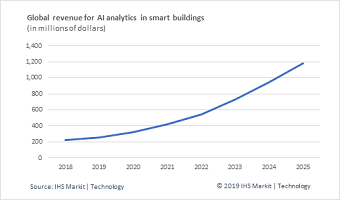 Friday, April 19, 2024
Friday, April 19, 2024  Friday, April 19, 2024
Friday, April 19, 2024 
While buildings have traditionally been perceived as stiff, fixed forms that merely provided a shell for its inhabitants and for the activities being conducted inside, structures outfitted with building management systems (BMS) are becoming more interactive and responsive to their occupants, according to a new study Artificial Intelligence in Smart Buildings – 2019, published by the research firm.
The study examines the potential presented by AI in smart buildings, as well as a roadmap showing both opportunities in the market and barriers to the wider adoption of AI-based solutions across a variety of end-user sectors.
Building owners are increasingly interested in what transpires inside buildings at any given time, utilising the knowledge and insights they obtain to improve building management, create better staffing plans, and reduce the operational costs of maintaining their business infrastructure in the hope of achieving higher profits.
In an ideal scenario, BMS platforms would run building systems based on conclusions drawn through the use of artificial intelligence, machine learning, and other complex statistical methods. The platform would then automatically adjust various subsystem settings without requiring involvement of the facilities manager, except for the approval of fundamental platform-level changes in specific circumstances.
While most AI solutions currently available are incapable of operating in such a model scenario, machine learning is increasingly being used across the buildings industry for more efficient operations.
Market revenue and segments
The market for AI analytics in smart buildings was worth $220.2 million in 2018, equivalent to approximately 9% of worldwide revenue for BMS platforms. But while there is wide acknowledgement that artificial intelligence can offer numerous benefits and efficiency gains for building systems, the adoption of BMS platforms with AI analytics will be relatively slow.
This protracted adoption can be attributed to a number of obstacles, including mistrust of AI, the significantly higher cost of deploying AI-powered platforms, and the limited functions of currently deployed machine-learning algorithms. Nonetheless, the use of AI in building management is a strong trend, and adoption of AI-powered BMS platforms is projected to increase, especially in new construction projects.
Keep reading on Smart-Energy.com
Deadline for this week in Friday at noon